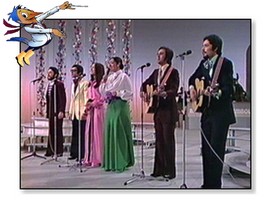
Their last album as a duo was released in 1992. Returning in 1983, they again began releasing albums on a regular basis, with 1985's Cuidado con la noche proving the most successful of their career. The couple had married in 1975, and took a career break in the early 1980s during which Estíbaliz gave birth to a daughter. The song became a major hit both in Spain and Latin America, where they became very popular, leading to the release of an album of Latin American songs in 1977. At the 20th Eurovision Song Contest, held in Stockholm on 22 March, "Tú volverás" placed 10th of the 19 entries. In 1975 Sergio and Estíbaliz were chosen internally by broadcaster Televisión Española as the Spanish representatives for that year's Eurovision Song Contest with the song " Tú volverás" ("You Will Return"). They released their first self-titled album the following year, which proved a success and was followed by further albums at approximately yearly intervals throughout the 1970s. Having met in 1968, the couple joined vocal group Mocedades, with whom they recorded three albums before leaving in 1972 to concentrate on a career as a duo. They were also known for their participation in the Eurovision Song Contest 1975. She had been a guide for the general public since 1994 when the just historic members still left had been her and Javier Garay.Sergio and Estíbaliz were a Spanish vocal duo, formed by Sergio Blanco Rivas (17 November 1948 – 15 February 2015) and Estíbaliz Uranga Amézaga (9 December 1952) who also worked with groups Mocedades and El Consorcio. Since she actually is the only historic member with Javier Garay in the group Mocedades currently, she actually is the guide for the fans as Amaya was for 15 years. After many changes of members in the group, she made a decision to play the lead singer for a few from the songs where her sister Amaya was the lead singer: “Charango”, “Has perdido tu tren”, “Desde que tú te has ido”, “Quién te cantará” and “La guerra cruel”. In 1999, she had a major accident which will make her avoid the group, yet this time a number of the members waited on her behalf to recover, others still left the group. She retrieved out of this outweigh over time during the following three years. She rejoined the group some a few months after with a significant outweigh. In 1982, through the recording from the album Amor de hombre, she suffered from a serious lumbago, so her sister Idoia stood in again for the recording of several songs from the album. This appreciated the group to contact her sister Idoia to stand in until she was prepared to rejoin the group for the concerts. In Dec 1973, she married the first choice of a rock-band, Juan Ruiz, with whom she had a girl, Macarena Ruiz Uranga, in-may 1978. Other tracks she sang as al business lead vocalist are “The greater I discover you”, “Like me sensitive”, “Dibujando Amor”, “Tiempo de Vals”, “Donde estés tú”, “Vivir sin ti” and “Hijo del corazón”. Once again in 1978 she was business lead vocalist in “Iruten”, contained in the recording Kantaldia. In 1977, she was once again lead singer inside a duo with José Ipiña for the music “De puro mío tu cuerpo” contained in the recording Mocedades 8. In 1975, she sang three tracks in an ideal duo with her sister Amaya, “Goizaldean” “Un afilador” and “Que pasará mañana”. In 1974 for the recording Mocedades 5, she documented “Crimson River Valley” as the business lead vocalist and she sang “European union therefore quero um xodo” along with her sister Amaya in an ideal duet. She’s been the business lead vocalist in a few music or at least for half from the music.
#Amaya uranga wiki plus
She usually did the backdrop vocals plus some second vocals with her sister Amaya, however in 1972, she recorded a music being the lead singer, “Rin Ron”. Izaskum was component of the group rather than still left it despite many adjustments of people in the group. In 1969, the group became Mocedades plus they released their initial album of 20.

During among their concerts, they fulfilled the Blanco brothers, Sergio and Rafael, plus some various other people, with whom they produced a fresh group, Voces y Guitarras, offering the Uranga sisters, their sibling Roberto, Sergio and Rafael Blanco, and three others, among which still left in 1969 because of the military service. Being a teen, she formed an organization with her sisters Amaya and Estíbaliz, Todas las Hermanas Uranga (The Uranga Sisters), playing folk music her dad had trained them when getting little. Third from the 9 kids that formed the Uranga family members, popular in Bilbao, she’s always liked performing.


 0 kommentar(er)
0 kommentar(er)
